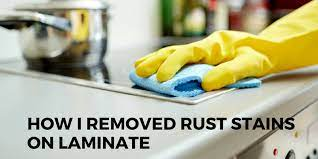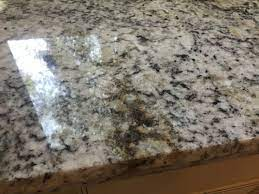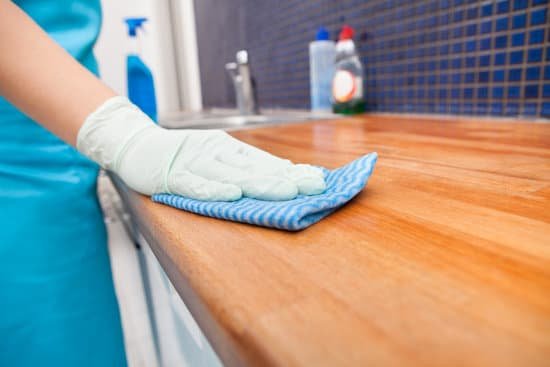Is your kitchen countertop stained with rust? Don’t worry, you’re not alone. This is a common problem that many people face. Luckily, there are several ways to remove rust stains from your countertop. In this article, we will discuss the best methods for removing these unsightly stains. We will also provide some tips on how to prevent them from occurring in the future. So read on for all you need to know about removing rust stains from kitchen countertops!
Also Read:How to Clean the Kitchen Splashback: The Definitive Guide
What is rust and why does it form on kitchen countertops specifically?

Rust is an iron oxide that forms when iron or steel is exposed to oxygen and moisture. This can happen over time due to the natural aging process of these materials. Additionally, rust can form if these materials are left outside in humid or wet conditions. Kitchen countertops are particularly susceptible to rusting because they are often made of steel or iron. They are also constantly exposed to moisture and humidity, which can speed up the rusting process.
There are several ways to remove rust stains from your countertop. The best method will depend on the severity of the stain and the type of material your countertop is made of. For example, if the stain is minor and your countertop is made of porcelain, you can probably remove it with a gentle cleanser and a soft cloth. If a countertops develops rust stains, the easiest way to clean it is with a paste that can be made from lemon juice and baking soda. However, if the stain is more severe or your countertop is made of marble, you may need to use a stronger cleaning agent.
How to identify rust stains on your countertops?

Rust stains can range in color from orange to red to brown. They are often circular or oval in shape. If you suspect that you have a rust stain on your countertop, the best way to confirm this is to take a close look at the stain. If it is indeed rust, you should be able to see small particles of iron oxide on the surface of the stain.
It’s in your best interest to take good care of and keep your countertops clean. Use a simple soap and water solution or rubbing alcohol and water solution. It’s a good idea never to use an abrasive cloth that may cause damage to your countertops.
What are some common causes of rust stains on countertops?

There are a few different things that can cause rust stains on countertops. One common cause is leaving metal objects (such as pots and pans) on the countertop for extended periods of time. This can happen if you forget to put them away after cooking or if you use them as decoration.
Another common cause of rust stains is using cleaning products that contain bleach. Bleach can react with the iron in countertops, causing rust to form. Finally, rust can also form if your countertop is made of cast iron or steel and is left outside in humid or wet conditions.
Types of rust removal methods – chemical or natural:

There are two main types of rust removal methods: chemical and natural.
Chemical rust removal involves using a cleaning agent that contains chemicals to break down the rust. Natural rust removal, on the other hand, uses items that you probably already have in your homes, such as vinegar or lemon juice.
Both methods can be effective at removing rust stains. However, natural methods are often gentler on countertops and may be less likely to damage the surface. Another solution to get rid of the rust is with baking soda and water. White vinegar also works well.
You must follow the best house cleaning and housekeeping tips from the experts.
How to remove rust stains from kitchen countertops with a chemical remover?
If you decide to use a chemical rust remover, there are a few things you need to keep in mind. First, make sure that the product you choose is safe to use on countertops. Second, always follow the instructions on the label. This will help ensure that you use the product correctly and safely.
Third, if possible, test the product on a small area of the countertop before using it on the entire stain. This will help you determine if it is effective and if it will damage your countertop. Spray a generous amount of furniture polish on a clean, dry cloth. Apply on the counter. Spray more on dull areas and wipe off in a circular motion.
How to remove rust stains from kitchen countertops with a natural remover?
Vinegar
There are several natural items that can be used to remove rust stains from kitchen countertops. One popular option is vinegar. Vinegar is acidic, which can help to break down the rust. To use vinegar, simply apply it to the stain and let it sit for a few minutes. Then, wipe it away with a damp cloth.
Lemon Juice
Another option is lemon juice. Lemon juice also has acidic properties that can help to remove stains. To use lemon juice, mix it with water and apply it to the stain. Let it sit for a few minutes before wiping it away with a damp cloth.
Baking Soda
Finally, you can also use baking soda. Baking soda is abrasive, which means it can help to scrub away rust stains. To use baking soda, mix it with water to form a paste. Apply the paste to the stain and scrub away with a soft cloth. This mixture can also be used as a window cleaner.
Let a rust-cleaning paste sit for half an hour before bringing the rust up with help from a professional house cleaner. If the stains don’t leave, you can increase the time by about an hour.
Use clean water to prevent damage because if you rub the countertop with anything harsh, it can cause even further damage. Simply use a paper towel after rinsing it thoroughly. Using bleach can cause surface damage that’s why you should avoid it.
Top methods to remove rust stains from kitchen countertops:

Chemical: Use a cleaning agent that contains chemicals to break down the rust.
Natural: Use items that you probably already have in your homes, such as vinegar or lemon juice.
Baking soda: Mix baking soda with water to form a paste and scrub away the stain.
Sandpaper: Gently sand away the rust stain with a fine-grit sandpaper.
Steel wool: Scrub away the rust with steel wool.
Abrasive sponge: Use an abrasive sponge to scrub away the rust.
Wire brush: Gently brush away the rust with a wire brush.
Hydrogen peroxide: Soak a cloth in hydrogen peroxide and apply it to the stain. Let it sit for a few minutes before wiping it away. You might have luck by making a poultice with hydrogen peroxide and talcum powder or borax, but that doesn’t always work. It’s best to avoid bleach altogether.
Prevention tips to keep your countertops rust-free in the future:
Prevention is always better than cure and the same rule applies to your kitchen countertops as well. Given below are a few tips which if followed religiously can help keep your countertops rust-free for a long time to come. Laminate countertops are nonporous, so rust stains usually come off easily.
While natural stone kitchen countertops are stunning, they are also prone to rust stains. If you have stone countertops rusting you need to get rid of, then consider investing in countertop rust remover.
Firstly, always remember to wipe off any water or moisture from your countertop immediately after use as water is the number one reason for rusting. Secondly, try and use cutting boards or trivets whenever possible to avoid direct contact of hot pans with the countertop surface.
Thirdly, avoid using harsh chemicals or abrasive house cleaners on the countertop as they can damage the protective coating and make it more susceptible to rusting. Professional house cleaners tend to provide all the best services if you ever hire that team of cleaners, you will not need to worry about anything.
And lastly, apply a sealant or Rust converting primer periodically to give an extra layer of protection to your countertop. By following these simple tips, you can enjoy rust-free and good-looking kitchen countertops for years to come.
Conclusion
Rust stains can be a nuisance, but with the right tools and knowledge, they can be removed fairly easily. We hope you found this guide helpful and that it has given you the information you need to remove those pesky rust stains from your kitchen countertop. Have any tips of your own? Share them in the comments below!

Hello! I’m trying to explore more and provide my readers with more. Besides being a writer, I’ve also worked as an Editor and Proofreader.
